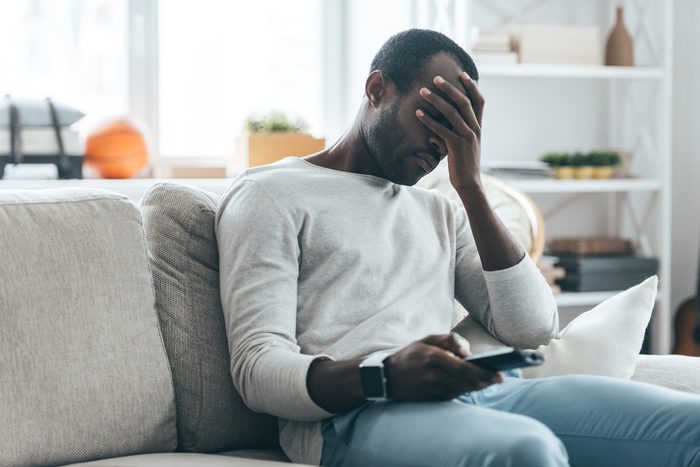It's damn stressful after your stroke when you find out YOUR DOCTOR DOESN'T KNOW ONE CONCRETE EXACT THING ABOUT GETTING YOU RECOVERED FULLY!
Exhausted From Living Through Stressful Events? A Resilience Expert’s 6 Tips to Stay Encouraged
The Ohio State University's director on stress, trauma, and resilience research offers right-now tips to help preserve your mental wellness.
Call it news fatigue. Thanks to issues like the pandemic, climate change, economic problems, inequality, and political instability, well… we’ve all been living through some pretty unique historical events. Now, with the war between Russia and Ukraine on the list—does anyone else want off this ride?
I, for one, would love the chance to duck out of each new “record-setting” event. Just recently, I lived through being evacuated during the once-in-a-thousand-years wildfires that tore through my Colorado town. (Wildfires! In December! The next day there was a blizzard!) While I can’t seem to stop following the news, I want to stay connected to mentally prepare myself for whatever is about to happen next. I know I’m not alone in my conflicted feelings and simmering stress.
These really are unprecedented times, says Ken Yeager, PhD, who leads Wexner Medical Center’s Stress, Trauma, and Resilience Program at the Ohio State University. Dr. Yeager says current events have led a lot of us to feeling some pretty raw emotions, including stress, anxiety, fear, and that eerie feeling of impending doom. “It’s like we’re all watching a train wreck, and it’s really very difficult to look away,” he says. “Everyone has to find a way to make sense of these uncertain times.”

Some people, like me, respond with a type of hyper-vigilance, constantly scrolling through the news and checking in with loved ones. Others, he says, ignore it as much as possible, trying to carry on with business as usual. Both strategies can cause extreme anxiety and don’t necessarily deliver much that’s very helpful.
So, instead of driving yourself crazy with worry or hiding from the world, what can you do to cope when the news feels dire? It’s about taking steps to foster your sense of mental wellness, says Dr. Yeager. Read his pro tips for surviving and thriving in stressful times, and check out 10 Science-Backed Ways to Lower Your Stress This Instant (Really!).
Know your feelings are valid
It’s OK to be scared and worried—that doesn’t mean you are weak or broken. Dr. Yeager suggests when you feel that pit in your stomach, take a minute to listen, rather than trying to push away your feelings. Try a guided meditation, journaling, or talking with a friend to help you process your feelings.
Go outside
One quick and simple way to combat that “the world is ending” feeling is to step outside, ideally in nature, and remind yourself of all the beauty and safety surrounding you. “Get some sun on your face—it’s an instant mood booster,” Dr. Yeager says.
(That calm and connected feeling from nature is also why the concept of “forest bathing” has been one of the biggest outdoor trends in recent years.)
Exercise
That walk outdoors, or any type of heart-pumping exercise, releases natural endorphins that instantly boost your mood and fight stress. (Some experts say the effect of walking on your mental health is particularly impressive.) Tucking your phone away to keep yourself present on your stroll is also a great way to give yourself a break from the news.
Grab dinner or coffee with a loved one
“Spending more time with friends and family is powerful for relieving anxiety and helping you feel more connected with yourself and your community,” Dr. Yeager says.
If the weather’s too rotten to go out or one of you is in quarantine, just give them a call. Isolation, which has been a pervasive experience since the start of the pandemic, actually increases anxiety and fear.
Stop checking your phone every five minutes
We know setting down the phone takes some serious discipline—but if you’re doomscrolling endlessly through news and social media feeds, this habit causes more stress. “Schedule a few times each day to look at your phone and then put it away for a while,” Dr. Yeager advises. “Keep it stored in another room or in a drawer if you’re tempted to look at it too often.”
Also consider reading “This Is the Only Thing That Helped Me Stop Doomscrolling.”
Find a way to help
Regardless of whether the scary event is across the world or right next door, here’s some reassuring news: You are not powerless. Finding a way to help—volunteering with a local relief group, donating money or time, or visiting a blood bank—equips you with the feeling that you’re doing something productive to do so you don’t feel depressed and disempowered as you sit and ruminate. (The American Red Cross’s Blood Donor app actually lets you know which healthcare facility received your blood, so you get a sense of the patient or patients who benefited from your donation. According to Kathy Hastings, mobile coordinator for Community Blood Bank of Northwest Pennsylvania and Western New York, reports that one blood donation actually helps three patients.)
For more on taking care of yourself, subscribe to The Healthy newsletter and get more good news here:
No comments:
Post a Comment